How Facebook restricted news in the Palestinian territories

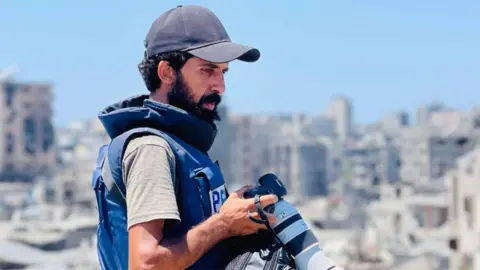 BBC
BBCAccording to BBC research, Facebook has severely restricted the ability of Palestinian news outlets to reach their audiences during the Israel–Gaza war.
In a comprehensive analysis of Facebook data, we found that audience engagement in the Palestinian territories – Gaza and the West Bank – declined significantly from October 2023.
The BBC has also seen leaked documents that show Instagram – another Meta-owned platform – has increased controls on Palestinian user comments after October 2023.
Meta – Facebook’s owner – says any implication that it has deliberately suppressed particular voices is “categorically false”.
Since the beginning of the Israel–Gaza war, only a few outside journalists have been allowed to enter the Palestinian coastal zone of Gaza from outside, and they were only able to do so under the protection of the Israeli military.
Social media has filled the void for people wanting to hear more voices from inside Gaza. The Facebook pages of news outlets such as Palestine TV, Wafa News Agency and Palestinian al-Watan News – which operate from the West Bank region – have become an important source of updates for many people around the world.
BBC News Arabic compiled engagement data on the Facebook pages of 20 major Palestinian-based news organizations in the year before and after Hamas’ attack on Israel on 7 October.
Engagement is an important measure of how much influence a social media account is having and how many people are viewing its content. This includes factors like number of comments, reactions and shares.
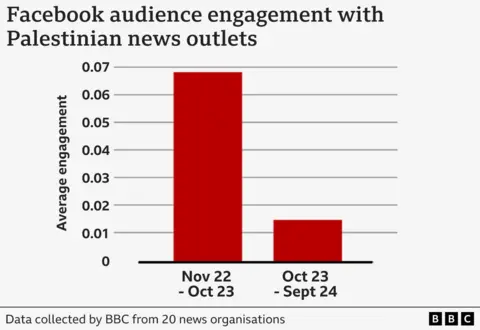
During the war period, audience engagement can be expected to increase. However, the data showed a 77% drop following the Hamas attacks on 7 October 2023.
Palestine TV has 5.8 million followers on Facebook. Journalists in the newsroom shared figures with us that showed a 60% drop in the number of people seeing their posts.
“Conversations were completely restricted and our posts stopped reaching people,” says the channel’s journalist Tariq Ziyad.
In the past year, Palestinian journalists have expressed fears that their online content is being “shadow-restricted” by Meta – in other words, restrictions are placed on how many people see it.
To test this, we conducted the same data analysis on the Facebook pages of 20 Israeli news organizations such as Yediot Aharonot, Israel Hayom, and Channel 13. These pages also posted large amounts of war-related content, but their audience engagement increased. About 37%.
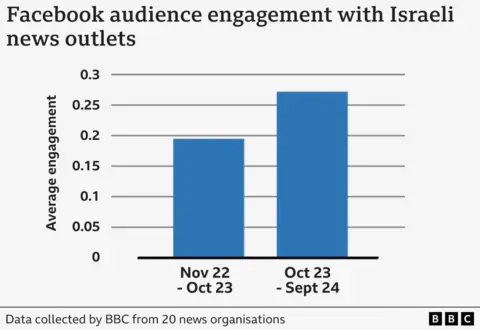
Meta has previously been accused by Palestinians and human rights groups Failing to fairly regulate online activity,
An independent report commissioned by the company in 2021 said this was not intentional, but due to a lack of Arabic-speaking expertise among intermediaries. Words and phrases were being interpreted as offensive or violent, when in fact they were harmless.
For example, the Arabic phrase “Alhamdulillah”, meaning “Praise be to God”, was sometimes being automatically translated as “Praise be to God, the Palestinian terrorists are fighting for their freedom”.
To see whether this explains the decline in engagement with Palestinian outlets, the BBC conducted the same analysis on Facebook pages for 30 major Arabic-language news sources based elsewhere, such as Sky News Arabia and Al-Jazeera.
However, these pages saw an average increase of almost 100% in engagement.
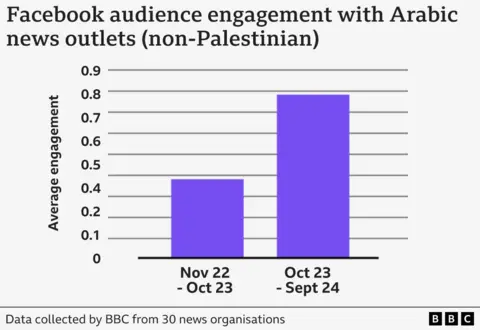
Responding to our research, Meta explained that it has made no secret of the “temporary product and policy measures” it will take in October 2023.
It said it faced a challenge in balancing the right to freedom of expression with the fact that Hamas was sanctioned by the US and designated as a dangerous organization under Meta’s own policies. .
The tech giant also said engagement was more likely to be affected on pages posting specifically about the war.
A spokesperson said, “We acknowledge that we make mistakes, but any implication that we deliberately suppress any particular voice is clearly false.”
leaked instagram documents
The BBC also spoke to five former and current employees of Meta about the impact their company’s policies have had on individual Palestinian users.
One person, who spoke anonymously, shared leaked internal documents about a change Instagram made to its algorithm that tightened the rules for commenting on Instagram posts by Palestinians.
“Within a week of the Hamas attack, the code was essentially changed, making it more offensive toward the Palestinian people,” he said.
Internal messages show that an engineer raised concerns about the order, concerned that it could “introduce a new bias into the system against Palestinian users”.
Meta confirmed it had taken the step, but said it was necessary to respond to “the increase in hateful content” coming from the Palestinian territories.
It said policy changes made at the beginning of the Israel-Gaza war have now been reversed, but did not say when that happened.
At least 137 Palestinian journalists have reportedly been killed in Gaza since the beginning of the conflict, but some continue despite threats.
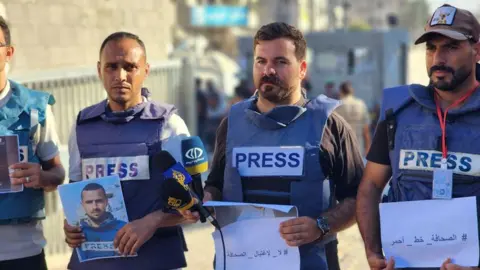 getty images
getty imagesOmar al Qata, one of the few photojournalists, says, “A lot of information cannot be published because it is too graphic – for example if the (Israeli) army commits a massacre and we film it, the video will not spread.” Those who chose to live in northern Gaza.
“But despite the challenges, risks and restrictions on content,” he says, “we must continue to share Palestinian content.”
Additional reporting by Rehab Ismail and Natalie Merzougui






